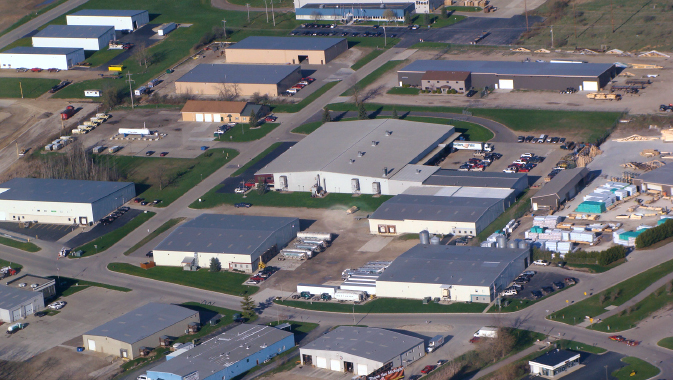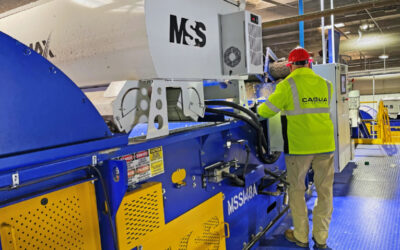Located in the geographic center of Michigan’s lower peninsula, Clare and Isabella Counties are ideally located for businesses seeking a low cost of production, a skilled workforce, and a good place to raise a family.
~
Michigan’s Clare and Isabella Counties attract—and retain—businesses because people enjoy living and doing business in the friendly, rural community. “The businesses that are here love it here,” says James McBryde, President and CEO of the Middle Michigan Development Corporation (MMDC). “The quality of life is very high in terms of housing and cost of living. The dollar goes a long way in this area. You can get a very nice house for much less money than that same house would cost in an urban area in Michigan—let alone other parts of the country.” In fact, Money Magazine and U.S. News & World Report have rated the community as one of the most affordable in the nation.
Good schools and supportive neighbors add to the positive business climate. “We have great communities, with people who are willing to pitch in and help each other out.” And, even though Clare and Isabella Counties are off the beaten track, they are not too far from Michigan’s heavily populated areas, so businesses can still operate efficiently. “We are close enough to the assembly factories that are to our south that we can do just in time delivery.” Located near major expressways, rail and an International Trade Zone, the community is just a couple hours away from Detroit, Grand Rapids, Port Huron and Michigan’s Upper Peninsula.
Clare and Isabella counties also boast plenty of entertainment opportunities. “We have a college town and a major university, which brings in all kinds of additional perks to the community with sports and the arts and entertainment,” Mr. McBryde points out. The Soaring Eagle Casino and Resort offers gaming, shows, a spa, restaurants, golf, and a luxury resort. Perhaps most notably, the region is renowned for its outdoor fun. “There are multiple inland lakes, rivers, trail heads, ski resorts, golf courses—you name it,” says Clare County Director Katherine Methner. “It is a great place to visit. It is a great place to live.”
Agriculture is a major industry in Clare and Isabella Counties. In addition, the region—and the town of Mt. Pleasant in particular—is active in the oil industry. “Mt. Pleasant has a lot of oil industry related businesses that have been around for years and years,” Ms. Methner reports. “It is really noted as a capital for the oil industry in Michigan.” Manufacturing is also critical to the region. “We have a lot of opportunity here for manufacturing,” says Mr. McBryde. “This is a rural area, but we have a surprising amount of manufacturing that goes on in these two counties.”
Advanced Battery Concepts produces an innovative bipolar, lead-acid battery, while Steelhead Industries builds manufacturing racks for Ford stamping plants. Delfield is one of the nation’s largest manufacturers of custom stainless steel refrigeration equipment. The industry leader also produces food service equipment, food holding tools, prep tables and custom-management equipment. Unified Brands is another world-class commercial kitchen equipment manufacturer based within the community, while Morbark and Bandit Industries are well known for their wood chippers and related products. “These two companies produce well over 50 percent of the wood chippers built in the United States,” Mr. McBryde shares.
Local manufacturers are enjoying a strong business climate and several have recently expanded their operations. MMDC—the state’s only development corporation to cover two counties—has worked closely with Morbark over the past several years to help the wood chipper manufacturer grow. The company secured nine State Trade and Export Promotion (STEP) grants between 2013 and 2015 to boost its exports around the globe. MMDC also helped Bandit Industries secure five STEP grants during the same period to boost exports worldwide. Unified Brands recently snagged a lucrative new contract and will be moving into a larger location and hiring 75 new employees.
Businesses in other sectors are enjoying expansions as well. For example, the wildly popular Cops and Doughnuts—owned by members of the Clare County Police Department—is expanding to two new cities within the region. “It is a tremendous tourist attraction,” Mr. McBryde remarks. “We have busloads of people on tour buses going through the state of Michigan that will stop at Cops and Doughnuts. It is a mandatory stop.”
MMDC has identified two key growth areas for the future. “We are always on the lookout for additional manufacturing capacity in a company that might want to locate here,” says Mr. McBryde. “At the same time we are aware that agricultural processing is an area that the state of Michigan has not aggressively gone after in the past. We are changing our focus—and this is at the state level too—for more of an emphasis on agricultural processing. In the past an organization like ours might not have pursued this area, but now we think that is a big growth area.”
Outside of California, Michigan has the most diversified agricultural sector in the United States, so the increased focus certainly makes sense. Currently, a substantial amount of agricultural product is shipped out of state for processing so MMDC—and state level economic development programs—are eager to see those manufacturing dollars remain in the community.
Craft brewing is just one agricultural processing area in which MMDC hopes to capitalize. “The brewing companies are always on the lookout for unique hops that can give a beer or an ale a certain flavor, so there is a real opportunity here,” Mr. McBryde points out. MMDC partnered with Mid Michigan Community College to host the state’s very first Hops Summit last fall. The event brought together more than 35 people including hops growers, processers, brewers, and representatives from the Michigan Department of Agriculture and Rural Development for an in-depth discussion on how to expand hops growing and processing within the region.
In addition, MMDC, the Saginaw Chippewa Indian Tribe, and Mid Michigan Community College worked together to secure a USDA grant for a feasibility study for hops processing in either Clare or Isabella Counties. “We think we already know what the study is going to tell us but we need to get the banks on board and get the financing that is going to be needed, so we really need the study,” Mr. McBryde explains.
MMDC has found that new and expanding businesses need support in site location and workforce training; this is in stark contrast to what businesses needed as they struggled to overcome the Global Financial Crisis a few years ago. “We are in a very different place than we were four or five years ago, when the discussion primarily focused on tax credits or tax incentives for relocating businesses,” Mr. McBryde recalls. “The companies that we have here are struggling to fill a number of the jobs we have here, especially with the skilled trades,”
MMDC is actively involved in several workforce training programs to remedy this problem. “We have melded workforce development and economic development,” says Ms. Methner. The first unified workforce development system in the United States, Michigan Works! Association is a key economic development partner throughout the state, including in Clare and Isabella Counties. The Skilled Trades Training Fund (STTF), another statewide workforce development program, provides funds to companies for short term, in-demand training. The program upgrades the skills of current employees in a wide variety of occupations, from CNC operations, CNC programming, and welding, to robotics, IT training, and electronic health records.
“Probably the state program that we are using the most is the Skilled Trades Training Program because that gives us the ability to help companies apply for state funds that don’t have the federal regulations attached to them,” Mr. McBryde shares. “[STTF is] very user friendly for business and pays up to $1,500 per person. We are really helping connect the companies with the program.”
Clare and Isabella Counties are ready to support business expansion while also providing the recreational opportunities, schools, and low cost of living that employers want. MMDC is eager to connect any incoming or expanding business will all that the region has to offer—from skilled workers to available real estate and incentives—in order to help these businesses meet their full potential.













